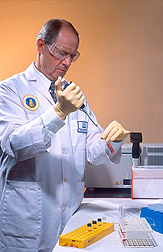Folate and Choline Interplay Investigated
|
|
|
|
Inside our bodies, the B vitamins folate and choline work in a delicate balance. A team led by ARS chemist Robert A. Jacob has now shown—for the first time in healthy people—that we can't synthesize enough choline if we are low in both choline and folate.
"That's in contrast to the assumption that the body can make as much choline as it needs," says Jacob. He is with the ARS Western Human Nutrition Research Center in Davis, California. Jacob's studies with healthy men and women volunteers agree with some of the findings of animal studies conducted earlier by ARS scientists at Tufts University in Boston and by nutrition researchers elsewhere. In all, these investigations helped pave the way for the recent announcement of a recommended daily amount of choline. "The choline recommendation," says Jacob, "is the first ever made in the United States for this nutrient." The Food and Nutrition Board of the National Academy of Sciences now suggests that an adequate choline intake is 425 milligrams a day for women and 550 milligrams for men. "There are about 250 milligrams of choline in a 12-ounce beef steak," he says. |
|
|
Choline Carries Out Many Chores
Choline helps the body absorb and use fats, including those that become part of membranes that keep our cells intact. "Choline deficiency," according to Jacob, "can result in fat accumulating in the liver and subsequent liver damage." In addition, choline is required for synthesizing acetylcholine, a neurotransmitter needed for memory storage and muscle control, for example. And choline—as well as folate—contains what's known as a methyl group, which the body uses to form genetic material, or DNA. "The process by which methyl groups, borrowed from methyl donors such as choline and folate, are added to DNA is known as DNA methylation," explains Jacob. It can be monitored in blood samples and is one of several indicators of the integrity, or condition, of DNA. Our bodies also use methyl groups from folate and choline to convert the amino acid homocysteine—which can be harmful at high amounts—into another amino acid called methionine. In turn, the body can convert methionine intoS-adenosylmethionine, a valuable methyl donor. That same compound is currently a popular supplement. This choline- or folate-assisted conversion of homocysteine prevents the body from accumulating an overload of homocysteine. High levels of homocysteine are associated with increased risk of heart attack or stroke. Choline, folate, and methionine are the body's primary sources of methyl groups. "If your supply of folate is low," says Jacob, "your body may compensate by taking methyl groups from choline. Our results indicate that under those conditions, your body might not be able to synthesize enough choline. You'll likely need more choline to help meet the increased demand." High Protein Means High Choline High-protein animal products like meats and dairy foods are rich in choline. So are soy foods. Folate is highest in plant sources such as orange juice; green leafy vegetables like spinach; grain products fortified with this vitamin, including bread flour, cornmeal, pasta, and rice; dried beans and peas; and most berries. Nuts and liver contain both nutrients. What's the best way to make sure you are getting enough folate and choline? "As you might expect," Jacob advises, "for most healthy people, a varied, balanced diet is probably the best bet. That should include an assortment of plant foods, which give you folate, and animal foods, which provide choline." Low-Folate Regimen Leads to Choline Crunch Jacob and colleagues conducted the folate and choline investigations in separate studies with 11 men, aged 33 to 46, and 10 postmenopausal women, aged 49 to 63, as volunteers. All were healthy and nonsmokers. The volunteers lived at the research center, then located in San Francisco, to ensure that they ate only foods meticulously measured and custom prepared for them by the research center's dietary staff. Women of childbearing age weren't allowed into the research because of evidence associating birth defects, such as spina bifida, with inadequate intake of folate before pregnancy. Throughout the 13- to 15-week studies, the volunteers followed a basic regimen that varied in the amount of folate it provided. The low-folate, low-choline portion of the study gave them as little as 13 percent of today's recommended daily allowance of folate, which is 400 micrograms. Later, researchers added folate back in the form of a supplement, boosting the level to as much as 130 percent of the recommended intake. In the men's study, the supplement was mixed with a soybean-based, high-energy shake that the volunteers drank at lunchtime. The women received their supplemental folate in applesauce served at breakfast and dinner. Tests of the volunteers' blood and liver function indicated that no severe choline or folate deficiencies occurred during the study. Nevertheless, blood levels of choline decreased an average of 25 to 28 percent in men and women during the low-folate, low-choline stints. But those levels returned to at least normal when researchers provided more folate. "We showed that the amount of folate you get dictates how much choline you need," Jacob says. He did the work with Donald J. Jenden of the University of California at Los Angeles School of Medicine; Marian E. Swendseid of the UCLA School of Public Health; and Margaret A. Allman-Farinelli of the University of Sydney Department of Biochemistry. The scientists published their findings in the Journal of Nutrition.—By Marcia Wood, Agricultural Research Service Information Staff. This research is part of Human Nutrition, an ARS National Program (#107) described on the World Wide Web at http://www.nps.ars.usda.gov. Robert A. Jacob is at the USDA-ARS Western Human Nutrition Research Center, One Shields Ave., Davis, CA 95616; phone (530) 752-4726, fax (530) 752-8502. |
|
"Folate and Choline Interplay Investigated" was published in the March 2001 issue of Agricultural Research magazine. |
|








